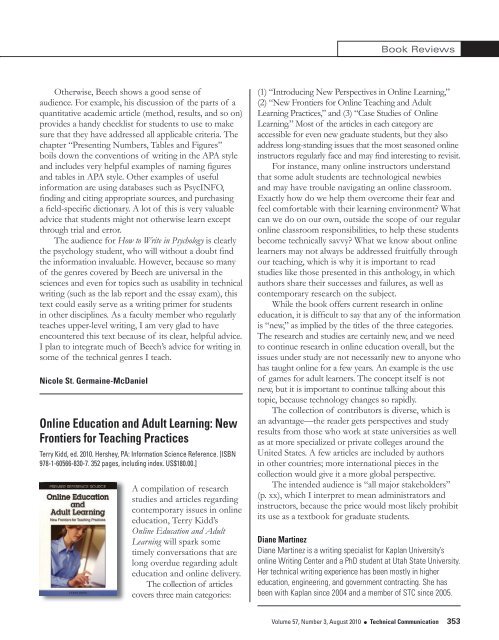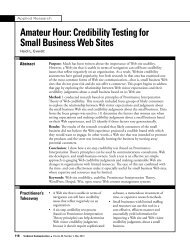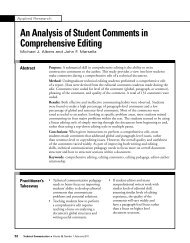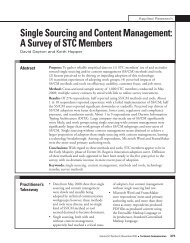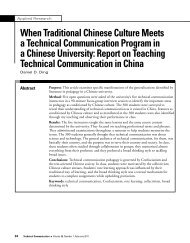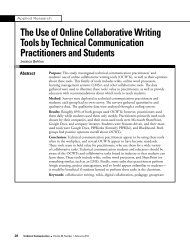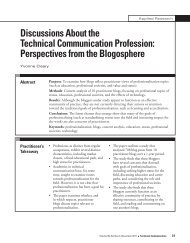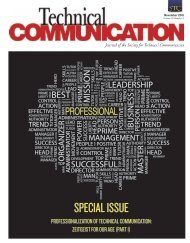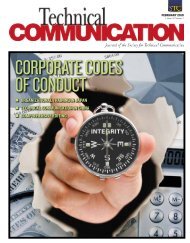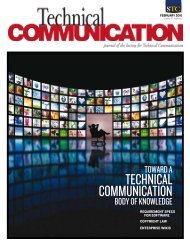CONTEXTS
Download: August 2010 - Technical Communication - Society for ...
Download: August 2010 - Technical Communication - Society for ...
- No tags were found...
Create successful ePaper yourself
Turn your PDF publications into a flip-book with our unique Google optimized e-Paper software.
Book ReviewsOtherwise, Beech shows a good sense ofaudience. For example, his discussion of the parts of aquantitative academic article (method, results, and so on)provides a handy checklist for students to use to makesure that they have addressed all applicable criteria. Thechapter “Presenting Numbers, Tables and Figures”boils down the conventions of writing in the APA styleand includes very helpful examples of naming figuresand tables in APA style. Other examples of usefulinformation are using databases such as PsycINFO,finding and citing appropriate sources, and purchasinga field-specific dictionary. A lot of this is very valuableadvice that students might not otherwise learn exceptthrough trial and error.The audience for How to Write in Psychology is clearlythe psychology student, who will without a doubt findthe information invaluable. However, because so manyof the genres covered by Beech are universal in thesciences and even for topics such as usability in technicalwriting (such as the lab report and the essay exam), thistext could easily serve as a writing primer for studentsin other disciplines. As a faculty member who regularlyteaches upper-level writing, I am very glad to haveencountered this text because of its clear, helpful advice.I plan to integrate much of Beech’s advice for writing insome of the technical genres I teach.Nicole St. Germaine-McDanielOnline Education and Adult Learning: NewFrontiers for Teaching PracticesTerry Kidd, ed. 2010. Hershey, PA: Information Science Reference. [ISBN978-1-60566-830-7. 352 pages, including index. US$180.00.]A compilation of researchstudies and articles regardingcontemporary issues in onlineeducation, Terry Kidd’sOnline Education and AdultLearning will spark sometimely conversations that arelong overdue regarding adulteducation and online delivery.The collection of articlescovers three main categories:(1) “Introducing New Perspectives in Online Learning,”(2) “New Frontiers for Online Teaching and AdultLearning Practices,” and (3) “Case Studies of OnlineLearning.” Most of the articles in each category areaccessible for even new graduate students, but they alsoaddress long-standing issues that the most seasoned onlineinstructors regularly face and may find interesting to revisit.For instance, many online instructors understandthat some adult students are technological newbiesand may have trouble navigating an online classroom.Exactly how do we help them overcome their fear andfeel comfortable with their learning environment? Whatcan we do on our own, outside the scope of our regularonline classroom responsibilities, to help these studentsbecome technically savvy? What we know about onlinelearners may not always be addressed fruitfully throughour teaching, which is why it is important to readstudies like those presented in this anthology, in whichauthors share their successes and failures, as well ascontemporary research on the subject.While the book offers current research in onlineeducation, it is difficult to say that any of the informationis “new,” as implied by the titles of the three categories.The research and studies are certainly new, and we needto continue research in online education overall, but theissues under study are not necessarily new to anyone whohas taught online for a few years. An example is the useof games for adult learners. The concept itself is notnew, but it is important to continue talking about thistopic, because technology changes so rapidly.The collection of contributors is diverse, which isan advantage—the reader gets perspectives and studyresults from those who work at state universities as wellas at more specialized or private colleges around theUnited States. A few articles are included by authorsin other countries; more international pieces in thecollection would give it a more global perspective.The intended audience is “all major stakeholders”(p. xx), which I interpret to mean administrators andinstructors, because the price would most likely prohibitits use as a textbook for graduate students.Diane MartinezDiane Martinez is a writing specialist for Kaplan University’sonline Writing Center and a PhD student at Utah State University.Her technical writing experience has been mostly in highereducation, engineering, and government contracting. She hasbeen with Kaplan since 2004 and a member of STC since 2005.Volume 57, Number 3, August 2010 l Technical Communication 353


